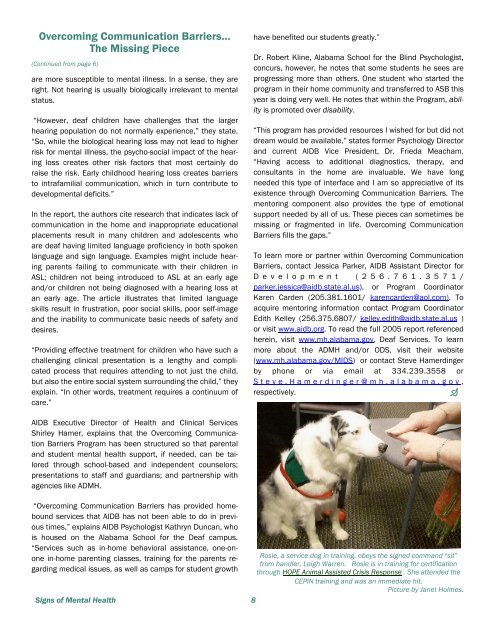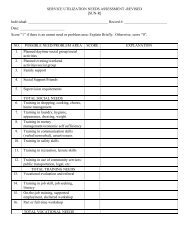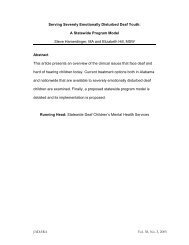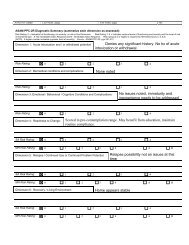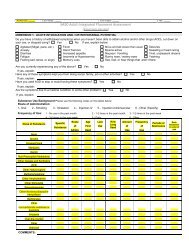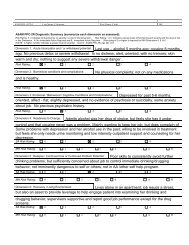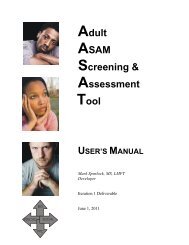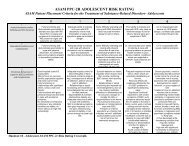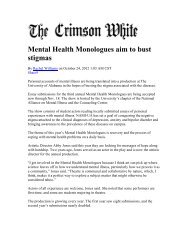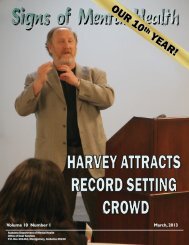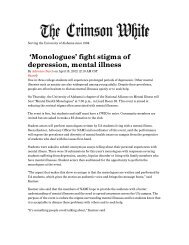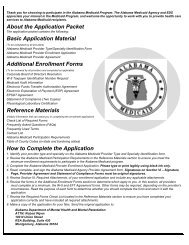Volume 7 Number 2 May, 2010 - Alabama Department of Mental ...
Volume 7 Number 2 May, 2010 - Alabama Department of Mental ...
Volume 7 Number 2 May, 2010 - Alabama Department of Mental ...
Create successful ePaper yourself
Turn your PDF publications into a flip-book with our unique Google optimized e-Paper software.
Overcoming Communication Barriers…The Missing Piece(Continued from page 6)are more susceptible to mental illness. In a sense, they areright. Not hearing is usually biologically irrelevant to mentalstatus.“However, deaf children have challenges that the largerhearing population do not normally experience,” they state.“So, while the biological hearing loss may not lead to higherrisk for mental illness, the psycho-social impact <strong>of</strong> the hearingloss creates other risk factors that most certainly doraise the risk. Early childhood hearing loss creates barriersto intrafamilial communication, which in turn contribute todevelopmental deficits.”In the report, the authors cite research that indicates lack <strong>of</strong>communication in the home and inappropriate educationalplacements result in many children and adolescents whoare deaf having limited language pr<strong>of</strong>iciency in both spokenlanguage and sign language. Examples might include hearingparents failing to communicate with their children inASL; children not being introduced to ASL at an early ageand/or children not being diagnosed with a hearing loss atan early age. The article illustrates that limited languageskills result in frustration, poor social skills, poor self-imageand the inability to communicate basic needs <strong>of</strong> safety anddesires.“Providing effective treatment for children who have such achallenging clinical presentation is a lengthy and complicatedprocess that requires attending to not just the child,but also the entire social system surrounding the child,” theyexplain. “In other words, treatment requires a continuum <strong>of</strong>care.”have benefited our students greatly.”Dr. Robert Kline, <strong>Alabama</strong> School for the Blind Psychologist,concurs, however, he notes that some students he sees areprogressing more than others. One student who started theprogram in their home community and transferred to ASB thisyear is doing very well. He notes that within the Program, abilityis promoted over disability.“This program has provided resources I wished for but did notdream would be available,” states former Psychology Directorand current AIDB Vice President, Dr. Frieda Meacham.“Having access to additional diagnostics, therapy, andconsultants in the home are invaluable. We have longneeded this type <strong>of</strong> interface and I am so appreciative <strong>of</strong> itsexistence through Overcoming Communication Barriers. Thementoring component also provides the type <strong>of</strong> emotionalsupport needed by all <strong>of</strong> us. These pieces can sometimes bemissing or fragmented in life. Overcoming CommunicationBarriers fills the gaps.”To learn more or partner within Overcoming CommunicationBarriers, contact Jessica Parker, AIDB Assistant Director forDevelopment (256.761.3571/parker.jessica@aidb.state.al.us), or Program CoordinatorKaren Carden (205.381.1601/ karencarden@aol.com). Toacquire mentoring information contact Program CoordinatorEdith Kelley (256.375.6807/ kelley.edith@aidb.state.al.us )or visit www.aidb.org. To read the full 2005 report referencedherein, visit www.mh.alabama.gov, Deaf Services. To learnmore about the ADMH and/or ODS, visit their website(www.mh.alabama.gov/MIDS) or contact Steve Hamerdingerby phone or via email at 334.239.3558 orSteve.Hamerdinger@mh.alabama.gov,respectively.AIDB Executive Director <strong>of</strong> Health and Clinical ServicesShirley Hamer, explains that the Overcoming CommunicationBarriers Program has been structured so that parentaland student mental health support, if needed, can be tailoredthrough school-based and independent counselors;presentations to staff and guardians; and partnership withagencies like ADMH.“Overcoming Communication Barriers has provided homeboundservices that AIDB has not been able to do in previoustimes,” explains AIDB Psychologist Kathryn Duncan, whois housed on the <strong>Alabama</strong> School for the Deaf campus.“Services such as in-home behavioral assistance, one-ononein-home parenting classes, training for the parents regardingmedical issues, as well as camps for student growthSigns <strong>of</strong> <strong>Mental</strong> Health 8Rosie, a service dog in training, obeys the signed command “sit”from handler, Leigh Warren. Rosie is in training for certificationthrough HOPE Animal Assisted Crisis Response . She attended theCEPIN training and was an immediate hit.Picture by Janet Holmes.


